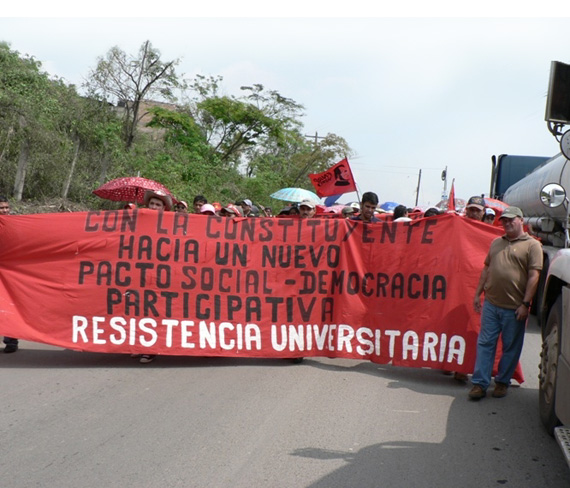Thousands
of Hondurans mobilized across the country to launch a signature campaign, which
will run until June 28, the first anniversary of the coup d’état. The goal of
the campaign is to show the current government and the de facto powers that
perpetrated the coup that the people of Honduras demand a refounding of the
nation through a new constitution. After the mobilization, the kidnapping of a
known Resistance activist was reported.
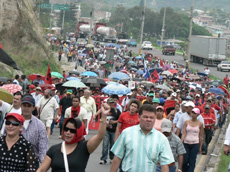 |
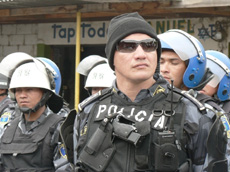 |
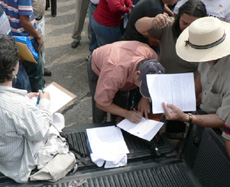 |
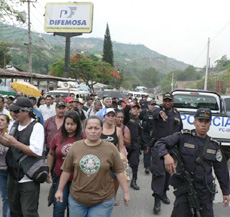 |
|
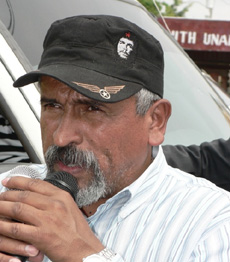
Juan Barahona |
|
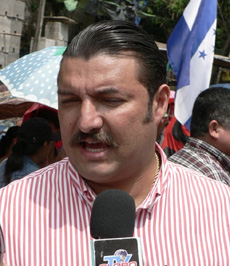
Rasel
Tomé |
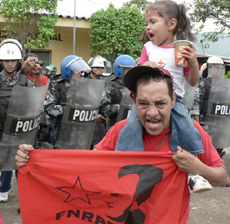 |
|
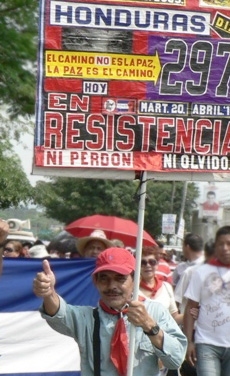
Oscar
Flores |
Ten
months have passed since the Honduran people saw their hopes of building their
own future shattered.
On the morning
of Jun. 28, 2009, Hondurans rose early to go to the polls and vote in the
country’s Popular Referendum. They were to decide if in the November elections a
fourth ballot box would be included to ask Hondurans whether the country should
convene a national Constituent Assembly to draft a new constitution.
Before the
polls opened, the de facto powers that control the country’s politics and
economy, in connivance with the State’s repressive forces and their
international allies, seized
Honduras’
democratically-elected President by force, ousting him from power and banishing
him from the country.
What they didn’t count on was the
reaction of the population and the effects the coup would have on popular
organizations and people in general. It produced a “boomerang effect” that
consolidated a resistance struggle that is still going strong 298 days later.
Now, the
National Popular Resistance Front (FNRP) is calling on the Honduran
people again to demand a refounding of the country through a popular and
democratic Constituent Assembly.
To take on this
new challenge, the FNRP organized a new mobilization that involved tens
of thousands of Hondurans around the country.
“Today,
April 20, we are launching the campaign for a Popular Referendum, in which we
will collect signatures to establish a National Constituent Assembly,”
Juan Barahona,
a member of the FNRP national coordinating committee, told
Sirel.
“We are also
asking for father Andrés
Tamayo
and former president
Manuel Zelaya
to be allowed to return to the country without conditions.”
Barahona
explained that the signature gathering campaign will conclude on Jun. 28,
exactly one year after the coup d’état, and that the FNRP’s goal is to
collect a minimum of one million signatures.
“The
Constituent Assembly cannot be put off any more; the Honduran people are
demanding it. The FNRP’s departmental, municipal and local coordinating
committees will be in charge of campaign efforts throughout the country, in
coordination with the national structure,”
Barahona
continued.
During the
large mobilization held in Tegucigalpa, thousands of people signed the Sovereign
Declaration for a Constituent Assembly, and for over three hours they occupied
the southbound highway, blocking national and international traffic.
“What we’re
beginning today is a process that will allow us to refound our nation,”
Rasel Tomé,
leader of the resistance liberals, told
Sirel.
“They staged the coup to halt a
process of change that was underway. But they were mistaken in thinking they
could stop it. The Honduran people have stood firm in their peaceful resistance
and have come together to form the FNRP, which is perhaps the most important
social and political platform ever created in our country,”
Tomé
said.
After the rally
and before the special police corps arrived, the protesters decided to march on
to the national airport, where they concluded their mobilization.
“Days ago,
former president Rafael
Callejas
said we would never be able to establish a Constituent Assembly, because we
didn’t have the support of the population.”
“Well, we’ll
show them,” Juan
Barahona
said as the mobilization ended, “that the majority of Hondurans are with us,
fighting for this goal.”
“We’re going to
show these oligarchs that all they did on Jun. 28, 2009 was postpone for some
months the establishment of the Constituent Assembly.”
“We will not
give up our struggle, and we’re going to go on organizing, training and
mobilizing our resistance front,”
Barahona
concluded.
Before
finishing this article, SIREL learned that
Oscar Flores,
a member of the Resistance, had disappeared immediately after the mobilization.
According to the information
obtained by Sirel, and as of yet
unconfirmed, the last anybody heard from Flores was a call from his cell phone
reporting that he had been kidnapped by the police. The call was cut off
abruptly and nobody was able to reach him again after that.
Human rights
organizations immediately began a search, going to every police station, but
were unable to obtain any information on his whereabouts.
Oscar Flores
has participated in every mobilization organized by the FNRP, carrying a
sign in which he marked the number of days of the resistance. Just days before
the November 2009 elections, military officers had attempted to kidnap him, but
he was able to get away.
